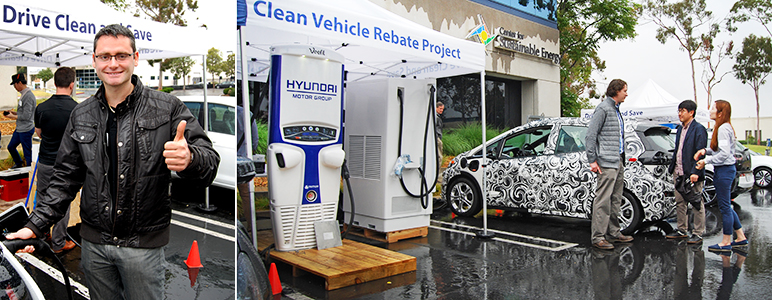

An international group of plug-in electric vehicle (PEV) makers and charging station manufacturers gathered to test the capabilities of their products to successfully interact and meet specific vehicle charging protocols during a two-day, noncompetitive event held at CSE on April 7 and 8.
The testing symposium, organized by CSE, TU Dortmund University in Germany and the ISO/IEC 15118 Joint Working Group, was a way for the two PEV industry sectors to advance standardization of PEV charging that will support greater vehicle adoption, lower costs and help develop charging as a way to increase electrical grid reliability. More than 90 participants from 38 companies, universities and research centers worldwide attended.
Teams of automotive and electrical engineers representing seven auto companies brought both current production models and prototype electric vehicles to test their ability to “refuel” at any of the available charging stations regardless of the manufacturer and without complications. The companies participating included BMW, Ford, General Motors, Honda, Hyundai, Porsche and Volkswagen.
The electric vehicle charging stations included both direct-current and alternating-current systems that are currently in production as well as numerous “simulated” charging systems, consisting of laptop computers and communications hardware, to test various system components. Participating manufacturers included BTCPower, IES Synergy, Siemens, Signet Systems, Tritium and RWE Effizienz.
According to Michelle Bogen, a CSE advanced energy projects associate, most all of the PEVs tested communicated successfully with the six production model chargers after numerous software and hardware tweaks.
Bogen said the overall purpose of the tests was to support further development and implementation of an international standard for PEV charging based on a communication protocol known as ISO 15118 that allows charging systems to work together seamlessly. CSE and partners KnGrid and RWE, leaders in vehicle-grid communications, are working on creating an advanced charging platform for integrating PEV charging with real-time grid conditions under a $1.5 million grant from the California Energy Commission.
The event demonstrated the feasibility of close communications and testing among competing PEV stakeholders, allowing them to work together “to find the unpredictable” system bugs, according to Jeff Koncsol of Vector Informatik, a German manufacturer of electronic control units.

